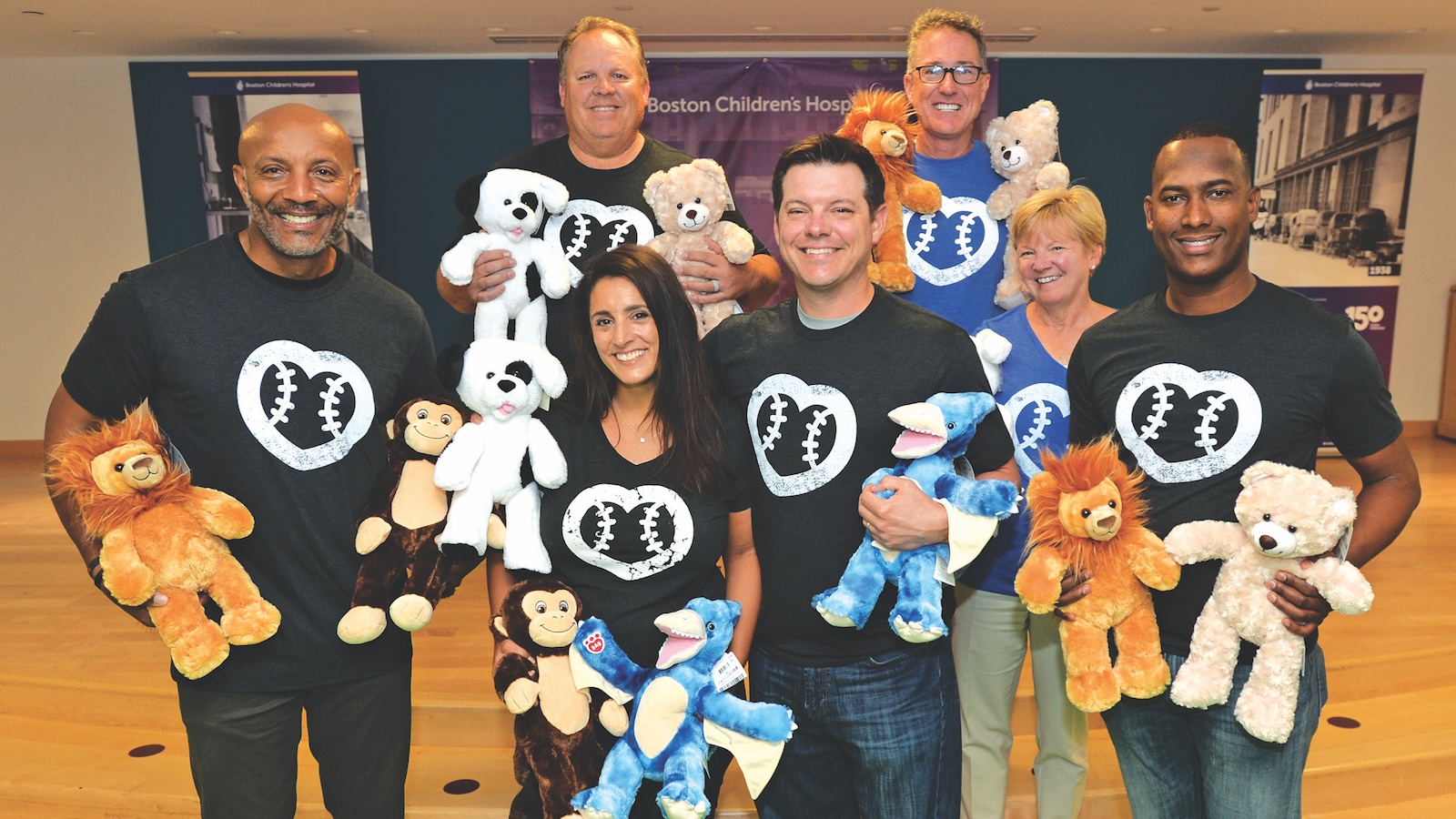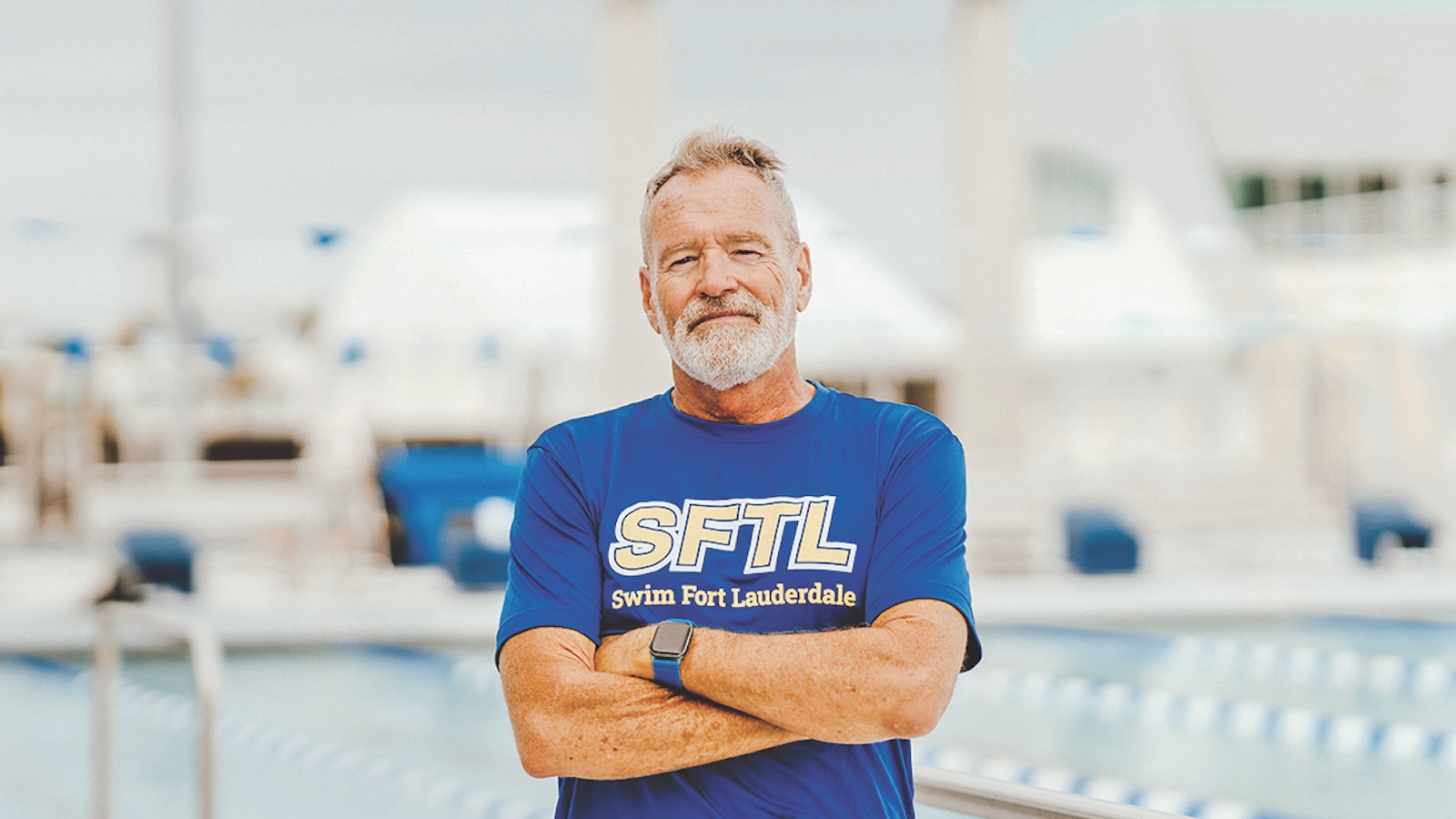Going to Bat for Others
There are few things Jennifer Skolochenko-Platt ’99 cares about more than helping kids.
Jennifer Skolochenko-Platt might be the only baseball fan on Earth who never complains about the umpires.
Her perspective — like theirs on the diamond — is unique. For the past dozen years, she’s run UMPS CARE Charities, the official charity of Major League Baseball’s marshals, the men so many fans love to hate.
Spend just a few minutes with Skolochenko- Platt ’99 and your opinion on the boys in blue just might change.
“They’re human beings behind the mask,” she says. “Sports officials in general are by nature giving people. You start out in youth sports, you’re not there for the money. You want to give back to your community, you want to give back to the game and the kids. They’re a lot of different personalities, but at their core they’re really great people who want to help.”
The same can be said of Skolochenko-Platt. She’s dedicated her working life to community relations, first in baseball and then in nonprofits. Since taking over as UMPS CARE’s executive director in 2012, she’s elevated it to new heights. Last year, umpires and volunteers put in 4,773 volunteer hours in support of several of the organization’s programs, including Blue for Kids, for which they visit children in the hospital.
“UMPS CARE is always one of my favorite events to provide for patients and families just because it’s so well run,” says Peyton Pike, special programs and arts and health coordinator for Johns Hopkins Children’s Center in Baltimore. “Jenn does an excellent job in preparing the umps for what to expect. They hit the mark every single time.”
Much of that credit, says former umpire Jim Reynolds, should go to Skolochenko-Platt.
“There is a direct correlation between her hire and our charity being able to raise more money and make more of an impact,” says Reynolds, who retired in 2022 after 24 seasons on the field and now works for the Commissioner’s Office as a supervisor of umpires. “She’s outgoing, she cares, she connects with people. Her presence in this organization is incalculable to us.”
Skolochenko-Platt was an athletic kid growing up. She played softball and volleyball, was a cheerleader and a member of the swim team. Her family lived in Clinton, Maryland, then moved to nearby Crofton, meaning the Skolochenkos were Orioles fans.
Her first two years at TU were spent in ROTC, and though she loved the experience, after a heart-to-heart conversation with her dad she decided against a career in the military. Instead, she double majored in communication and sports studies.
I never really thought much about working in the sports industry until I realized that it was a huge business and there were a lot of different opportunities.
JENNIFER SKOLOCHENKO-PLATT
Landing an internship was the next logical step, and fate intervened. Bill Stetka ’77, now a member of TU’s Alumni Board, was the Orioles’ assistant director of public relations at the time, and he was looking for some help. He called the then-undergraduate Skolochenko-Platt and offered her a position for the spring.
“It was my internship with the Orioles where I really got a vast view of all the different capacities that were in the sports business,” she says. “I thought I wanted to do public relations until I got into it and realized sports public relations is so different than public relations in other industries. But it opened my eyes to community relations and outreach, which is where I discovered my passion.”
Skolo, as Stetka, now director of Orioles alumni and the team historian, still calls her, fit in immediately.
“She was one of the best interns we ever had,” he says. “Jenn stands out not because she’s working in baseball now but because she cares passionately about her work and the people she helps. She asks questions, she had a good feel for people. She has that ‘it’ factor.”
After earning a master's degree in sports administration from St. Thomas University in Miami, Skolochenko-Platt worked in community relations for MLB’s Marlins for two years. She moved back to Maryland and, following a stint at Six Flags, joined the community relations department of the Washington Nationals, a franchise that had just relocated from Montreal.
A team of about 40 people were working in double-wide trailers in the parking lot of Washington’s RFK Stadium. They used port-o-potties for bathrooms.
“It was a unique experience,” she recalls. “A lot of late nights and early mornings. A lot of long hours. But to be there on Opening Day and watch the whole thing unfold and know that you played a part, it was incredibly rewarding.”
As a community outreach coordinator for the Nats, she helped establish a partnership with Most Valuable Kids, a nonprofit that distributed unused sporting and cultural event tickets to underserved youth and active-duty military and their dependents. She attended some of the games with the children and described the experience as magical.
One of the charities Most Valuable Kids worked with was UMPS CARE. Its Blue Crew Tickets program brings children battling chronic illness, kids in foster care, kids in youth baseball and softball programs and military families to Major League ballparks for VIP experiences that can include trips to the dugout and the umpires’ locker room. To date more than 9,000 children have benefitted.
By 2012, Skolochenko-Platt and her husband, Jimmy (an ESPN director) had settled in Edgewater, Maryland, where they still live with their four children. When UMPS CARE asked her to become its executive director, she felt the timing was right.

Left to right – MLB umpires in black shirts: CB Bucknor, Fieldin Culbreth (retired), D.J. Reyburn and Ramon De Jesus. (Those wearing blue shirts are volunteers.) Photo courtesy of Cindy Loo
UMPS CARE was founded in 2006 by a group of Major League umpires who, as the organization’s clever creed says, decided that “helping people is an easy call.”
“They had reached the top of their game and felt very grateful for the opportunities that were given to them and their families,” Skolochenko-Platt says. “Umpires live all over the country, some in Canada, some in Puerto Rico, the Dominican, Venezuela. But the one thing that they have in common is that they work in the same Major League cities. So they wanted to give back to those cities.”
Today, nearly all the 76 active Major League umpires are involved in UMPS CARE in one way or another. The All-Star College Scholarship program has awarded more than $350,000 in scholarships to young people who were adopted at or after the age of 13 whose parents may not have had an opportunity to save enough for college. The Official Leadership Program teaches social and emotional learning skills to young umpires while providing mentorship and a direct line to employment to teens in under- resourced communities.
“There is a huge crisis looming in youth sports because of the shortage of youth officials. My kids play youth sports, so I am seeing that firsthand,” Skolochenko-Platt says. Along with playing, one of her sons is enrolled in a soccer refereeing course, while another has dreams of becoming an ump. “The program is aimed at helping recruit and train the next generation of umpires and coupling it with leadership skills. It addresses a lot of the challenges that officials in all sports are facing. The treatment of officials, the negativity, the lack of respect. There’s a big problem there, and we’re working to be part of the solution.”
Skolochenko-Platt leads a full-time staff of three and serves as a sort of utility player for the organization.
“She does everything from stuffing envelopes to donor relations, but her strength is the connections she makes with our people and our donors,” Reynolds says. “She can speak passionately about our initiatives and what we’re trying to do.”
Blue for Kids is UMPS CARE’s flagship program. Hospitalized children are robbed of many freedoms; among them is the ability to make choices. That’s one reason why umpires bring Build-A-Bears — essentially customizable stuffed animals — when they make their 15 to 17 annual visits to children’s hospitals around the country. They’ve delivered 21,265 of them since 2006.
“Their care team is making their choices, their parents are making their choices,” Skolochenko-Platt says. “So the ability for them to choose a stuffed animal, to choose the outfit is something that’s really empowering to them.”
Umpires are not as recognizable, nor as beloved, as the players they share the field with, and thus, their impact on the hospitalized kids they visit is different. But when they arrive bearing gifts (sometimes with a team mascot, like the Oriole Bird, in tow) children quickly become enamored with them. Sometimes an umpire will tell a kid to look for them on TV that night during the game, and they’ll tip their cap as a signal to them.
We have the kids that are real baseball fans who think it’s really cool when we say, ‘These are the umpires that you're going to see at the Orioles game tonight.' But even if they don’t, when kids are in the hospital, there's so many hard things that happen. To have a fun and happy event like UMPS CARE [put on], it just changes the whole trajectory of the day.
Peyton Pike
For most baseball fans, Skolochenko-Platt is as anonymous as the ump working second base during a Pirates-Brewers game on a muggy Tuesday night in August. She’s fine with that; her reward comes from the gratitude she receives from the umpires she serves, from the young men and women who have had their college dreams funded by an UMPS CARE scholarship, from the smile on the face of a sick kid in the hospital whose day has been made a little brighter by a visit from UMPS CARE.
“I was approached by the child life specialist at a hospital during one visit, and she said, ‘This child has been practicing for you. They’re so excited to see you,’” she says. “We walked into the room and the child that was there was blind and hard of hearing. An adolescent, 13 or 14. He had been practicing singing ‘Take Me Out to the Ballgame’ all day. I stood there and listened to this child sing the best that he could — it was beautiful. It was a memory that will sit with me forever.”

